India has by far the largest number of wild Asian elephants in the world, estimated at 27,312 according to the 2017 census, about 55% of the species’ global population. Despite the animal being listed as endangered by IUCN, most Indians are aware of the animal and that is a reflection of the how ingrained the animal is in our culture and that it was widely distributed its habitat was widely spread across the country.
Well-loved, recognized for its intelligence the elephant is revered, adored by children & adults alike, who are fascinated as it walks past be it in a street or its home, the lush forests. With its commanding presence the elephant walks, the herbivore explores habitats seeking food and water to sustain, in turn nourishing a forest, creating pathways for other wild lifeform to thrive. This pattern requires its habitats to be long-range and continuous. With increased forest lands being cultivated and used for human activity, the forests are now fragmented and elephant habitats remain as isolated pockets connected by narrow corridors. To conserve the species, it is of utmost importance to protect these corridors and enable safe passage for the elephants.
The idea of taking Gajah (elephant) to the Prajah (people) was a key recommendation in the report of the Government of India’s Elephant Task Force (2010).
Taking this recommendation forward, Gaj Yatra was conceptualized by WTI to generate public and political will and the resources to help secure Right of Passage for elephants in India. The Gaj Yatra supplements our ‘Right of passage’ project through which we have identified 101 ‘elephant corridors’ across 11 elephant states in India. Corridors are crucial in connecting the otherwise fragmented elephant habitats. To secure a future for India’s wild elephants, it is essential that we ensure their unhindered movement between key habitats. And to do this, designated corridors must be legally secured and protected. We are partnering with the Government of India’s Project Elephant, the forest departments of elephant range states, and various non-governmental organizations (NGOs) to protect and secure the elephant corridors. Also, participation of the communities living around the elephant habitats is sought to generate public support towards the cause.
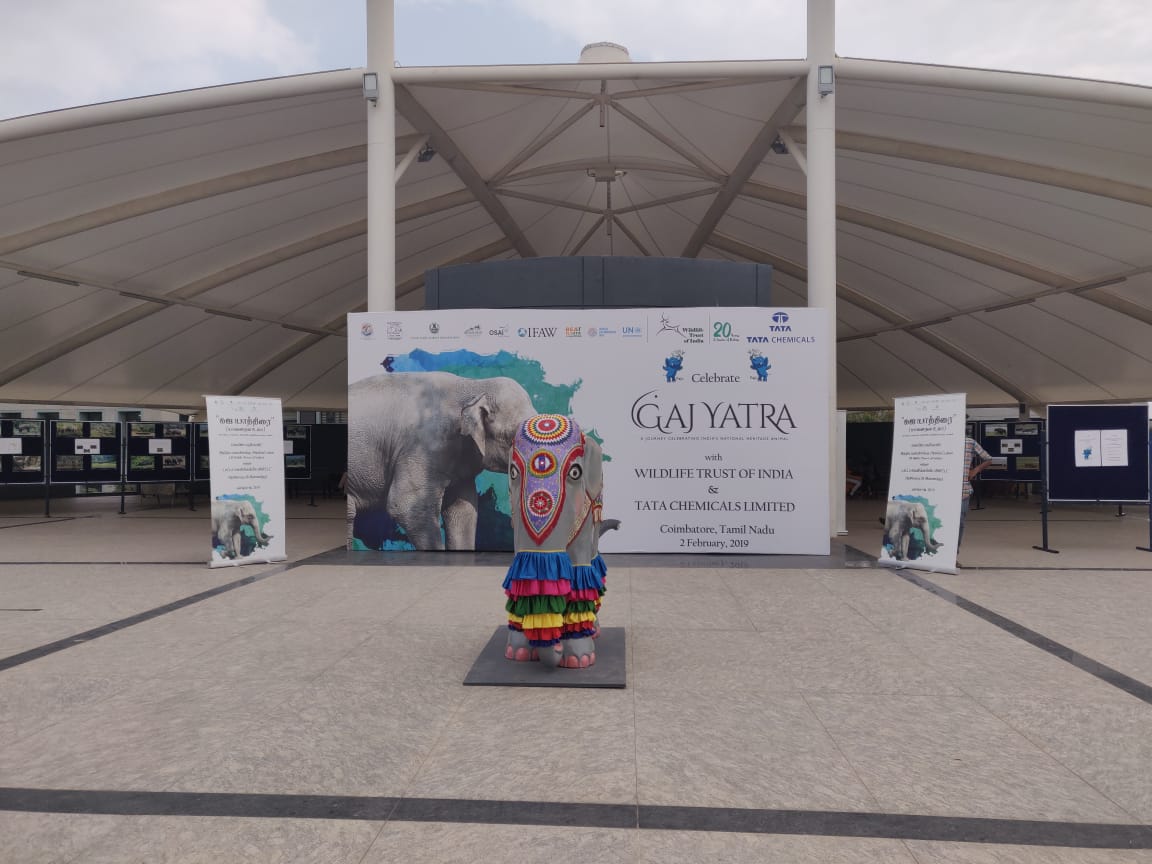
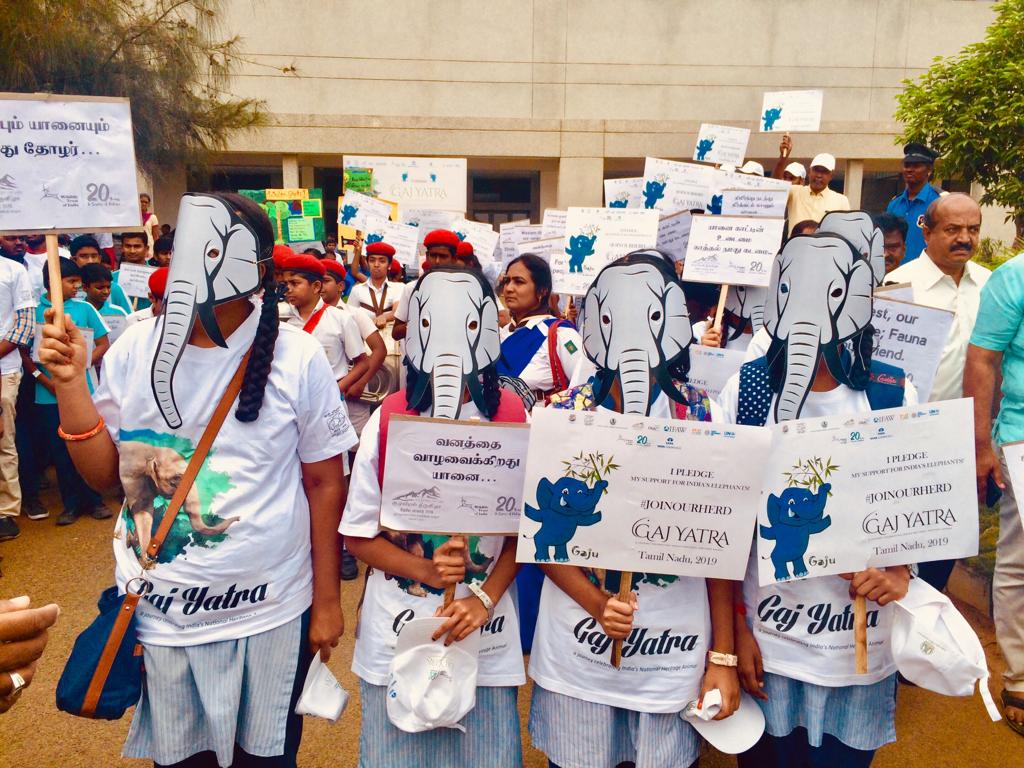
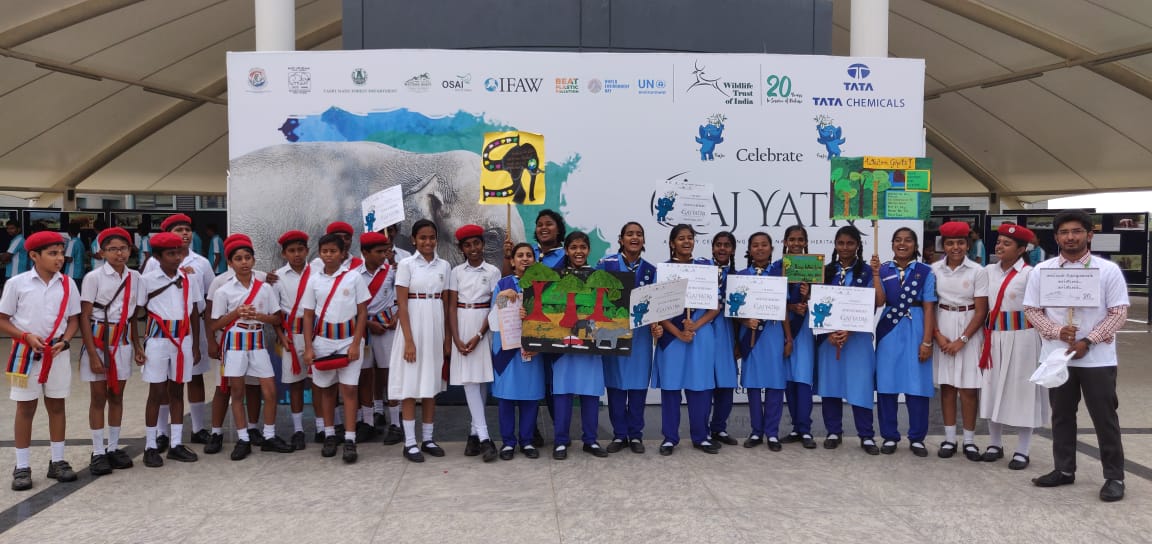
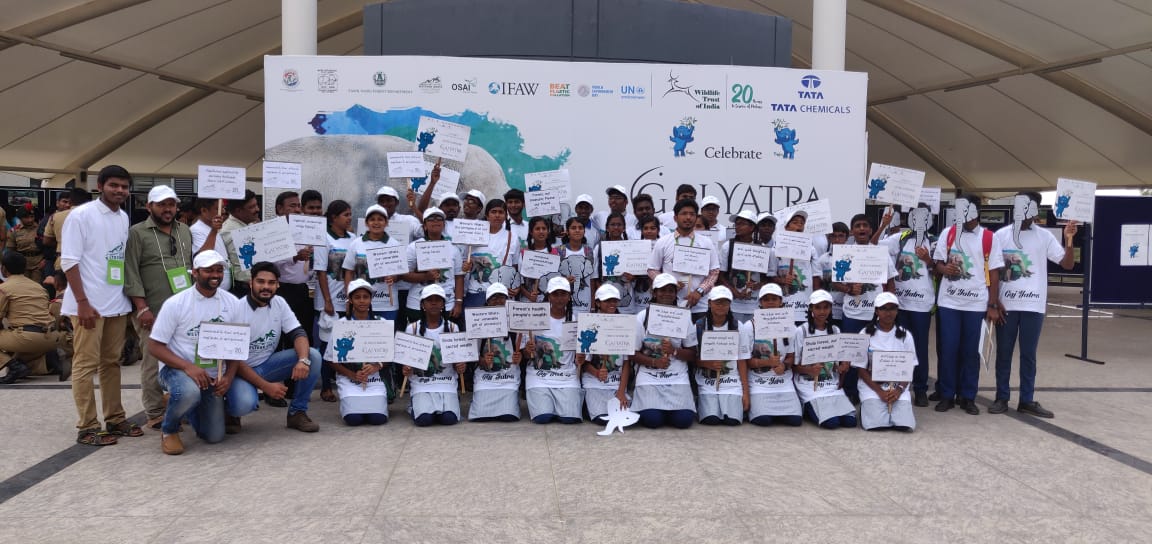
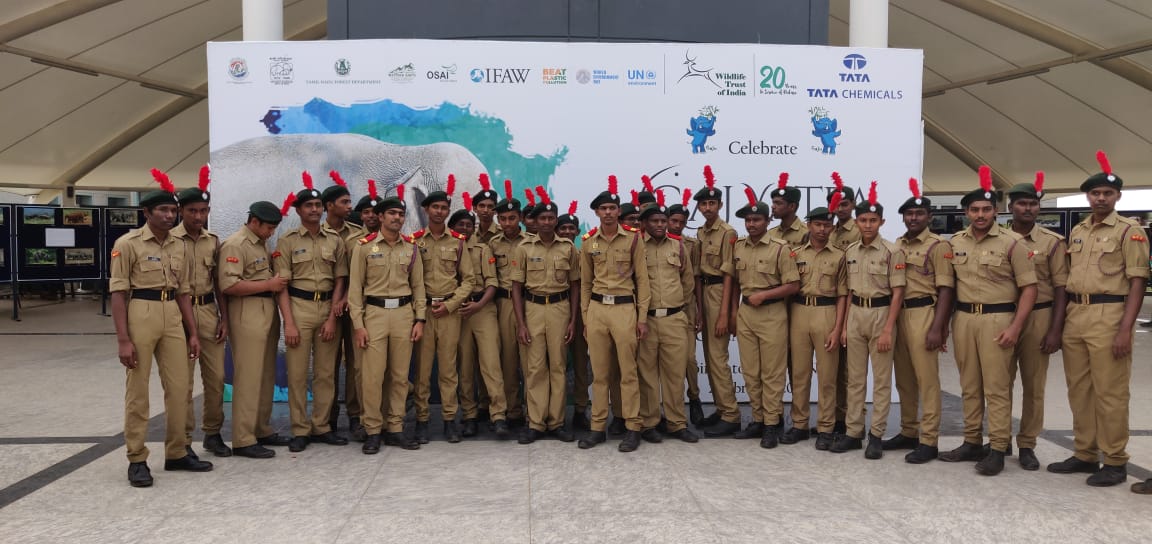
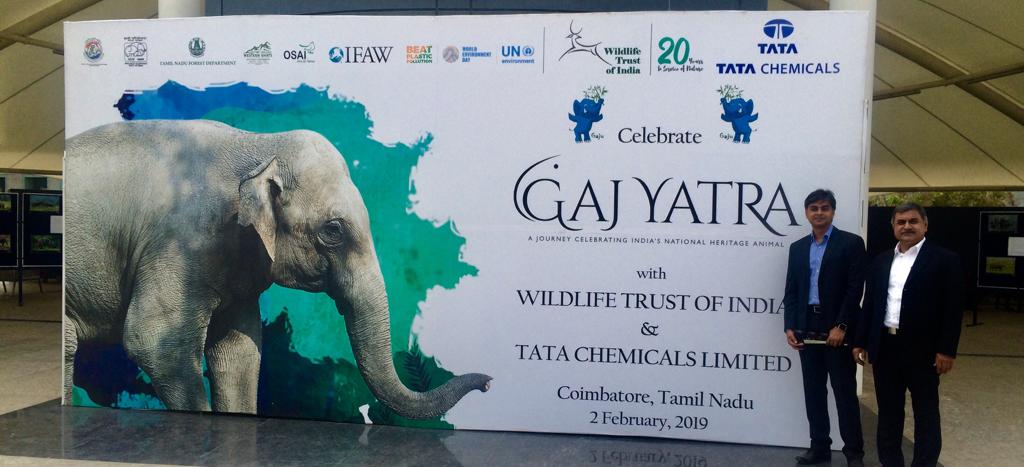
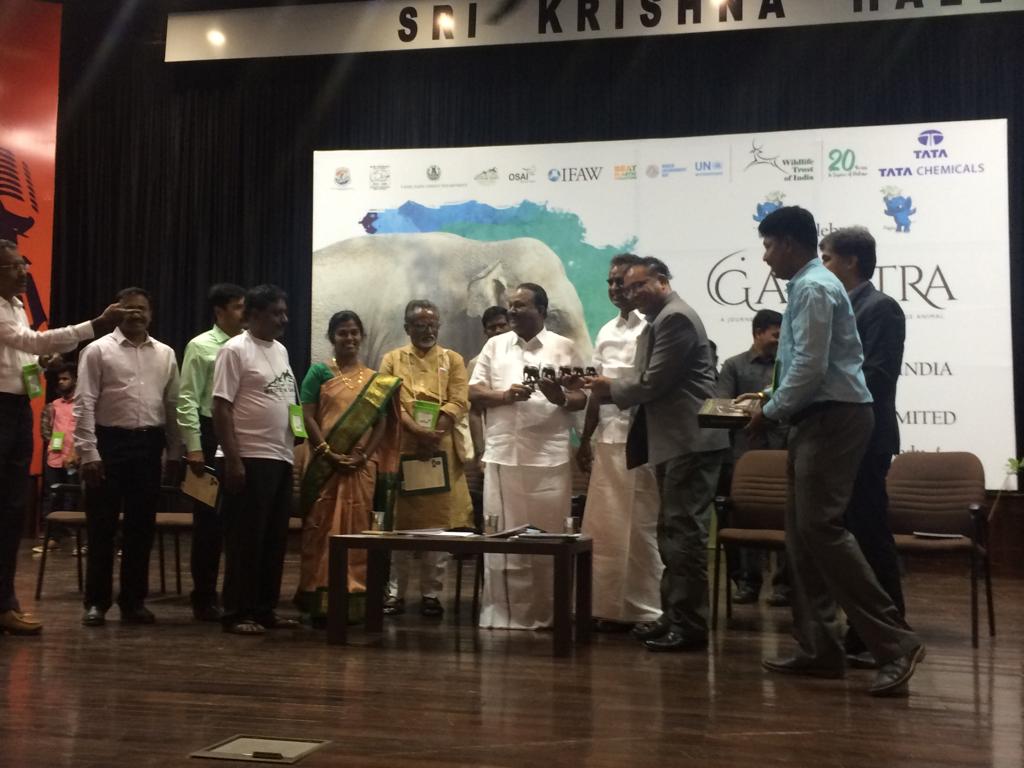

Gaj yatra as a component of a larger project- “Right of Passage” aims to ensure legal protection for elephant corridors and reduce human-elephant conflict. The campaign targets relevant stakeholders – policy makers, forest department, revenue department, development authorities, media, social influencers, local conservation organisations and individuals, local panchayats, local community – to build necessary groundswell towards the cause. Gaj Yatra accomplishes the initial steps towards securing the identified 101 elephant corridors with the messaging put forth and the relevant stakeholders put on board.
The campaign was launched in 2017 on the World Elephant Day through two consecutive events in Delhi and Mumbai. Following the launch, Gaj Yatra was showcased through a four- day event called ‘Gaj Mahotsav’ in Delhi in August 2018.
Of the 11 states with Elephant Corridors, so far the yatra has covered the states of Meghalaya. Tamil Nadu was the second state to be covered with support from Tata Chemicals Limited.
The campaign was successfully launched in Tamil Nadu on 2nd February 2019 at the Sri Krishna Arts and Science College, Coimbatore. The event was flagged off by Shri Dindigul C. Sreenivasan, Minister of Forests, Tamil Nadu. Also, Shri S.P. Velumani, Minister of Municipal Administration, Rural Development and Implementation of special programme, Tamil Nadu were present to grace the occasion.
The ‘yatra’ in the state commenced on 21st of February from Coimbatore region and culminated on the 8th of March in Chennai. Sixteen (16) elephant corridors identified within six tiger reserves and forest divisions were covered by the campaign. A convoy of three (3) elephant art pieces displayed on open vehicles travelled across the identified route covering seventeen (17) villages, towns and cities.
Starting from the Anaikatti and Mettupalayam regions in the Coimbatore Forest Division, the yatra progressed covering Ooty and Mudumalai regions within the Mudumalai Tiger Reserve and Nilgiris Forest Division. Further, the yatra covered places like Valparai, Pollachi within Anaimalai Tiger Reserve; Sathyamangalam, Bannari and Bhavanisagar regions in Sathyamangalam Tiger Reserve; Srivilliputhur and Rajapalayam in Srivilliputhur Grizzled Giant Squirrel Wildlife Sanctuary and Jawalagiri and surrounding regions within Hosur Forest Division and Cauvery North Wildlife Sanctuary.
Tamil Nadu Forest Department was a part of the awareness campaign and actively supported Gaj Yatra across the state. The Field Directors, District Forest Officers and Chief Wildlife Wardens for all forest divisions- Coimbatore, Anaimalai, Sathyamangalam, Srivilliputhur grizzled giant squirrel wildlife sanctuary, Hosur and Cauvery north wildlife sanctuary flagged off rallies for Gaj Yatra within their respective divisions thereby extending their support for the campaign.
Along with the Forest Department, the campaign was actively supported by the local communities, school and college students, local media channels and conservation organisations. Several public engagement events were conducted to sensitise the targeted stakeholders on the importance of the endangered Asian elephant and the need to facilitate Right of Passage for the gentle giant.
The closing event for Gaj Yatra was organized in Chennai at Sri Sairam Engineering college, Tambram on the 8th of March, 2019. Mr. Yogesh Singh, IFS, Additional Principal Chief Conservator of Forests and Director, Vandalur Zoological park, Chennai graced the occasion as the Chief guest.
A media workshop and interactive session involving twenty (20) media houses, several media students and elephant experts was also organised to discuss the issues surrounding elephant conservation and threats to elephant corridors.
The events were carried out in partnership with six regional organisations/individuals declared by WTI as Green Corridor Champions (GCCs) namely- OSAI Environment Organisation, A Rocha India, Nature Conservation Foundation (NCF), Wildlife Association of Rajapalayam (WAR), Jungle NGO and Dr B. Ramakrishnan, Assistant professor, Dept of wildlife biology, Govt. Arts college, Ooty. As Champions in their respective region, these teams will continue to be the eyes, ears and voices for the corridors charged with the responsibility of sensitizing, motivating and mobilizing the local communities with the ultimate aim of ensuring safe passage for elephants by creating a sense of pride and ownership for the corridors among the community. They will work to secure and monitor the functionality of the corridors by coordinating the actions of local self-governments, state and central governments and other stakeholders so that Right of Passage is ensured to elephants through this corridors and human-elephant coexistence strengthened.
As part of the campaign and the Right of Passage project, we will be planning to hold consultative workshops with stakeholders on ground like media, policy makers, tea plantation owners to try to get more people on board and get their support for the cause.
If you wish to join our herd and contribute to securing habitats for elephants and protecting our natural heritage animal, send us a message at rightofpassage@wti.org.in to get more details on how you can help or participate in campaign.